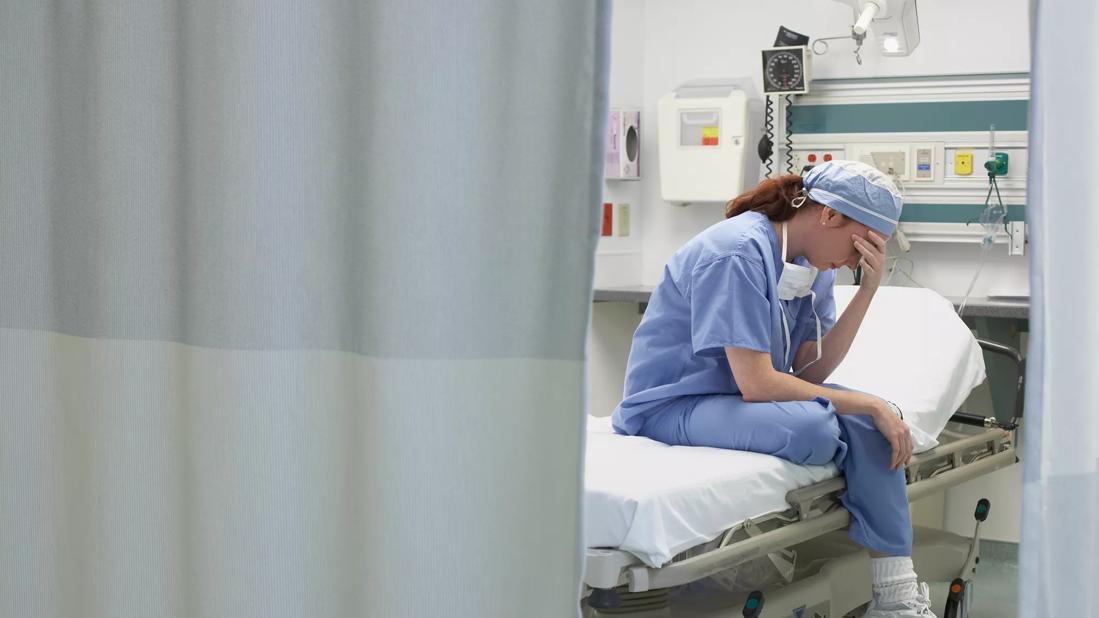Peers provide confidential support after distressing clinical events

The top priority for any nurse is the health and well-being of their patients, yet the unpredictable nature of illness and recovery can trigger feelings of guilt, fear, anxiety and grief in even the most experienced caregivers. Adverse clinical events, including the sudden death of a patient, can have serious emotional consequences for the nurses charged with their care.
Advertisement
Cleveland Clinic is a non-profit academic medical center. Advertising on our site helps support our mission. We do not endorse non-Cleveland Clinic products or services. Policy
“Nurses bear witness to tragedy every day. They develop relationships with our patients and advocate tirelessly on their behalf, but things don’t always go as planned,” says Dianna Copley, DNP, APRN-CNS, ACCNS-AG, CCRN, Clinical Nurse Specialist at Cleveland Clinic. “It can affect nurses deeply when someone they’ve cared for dies or experiences unexpected complications.”
According to a 2020 survey, 75% of Cleveland Clinic caregivers reported experiencing an adverse event at work. Interestingly, more than 80% shared that the type of help they most desired in the wake of a distressing event was support from a respected peer.
“The feedback we received from our caregivers revealed an opportunity to make Cleveland Clinic a more compassionate organization,” explains Copley. “By connecting our nurses with peers who understand the unique stresses of practicing in healthcare, we can provide the kind of support and encouragement they find most meaningful.”
In 2020, Cleveland Clinic convened an interdisciplinary team to develop a program designed to help caregivers manage their own grief and stress surrounding adverse patient encounters. The result was Emerge Stronger, a novel initiative that provides confidential, one-on-one peer support for any caregiver affected by an adverse clinical event.
Since the program was launched, nearly 230 caregivers in a variety of Cleveland Clinic roles have been trained as peer supporters. Among them is Jaclyn Ivy, BSN, RN, CAPA, a perianesthesia nurse at Cleveland Clinic Strongsville Family Health and Surgery Center, who says the program can help participants confront uncomfortable emotions surrounding an adverse event.
Advertisement
“As a peer supporter, I encourage my colleagues to discuss and embrace their emotions,” she explains. “It takes an enormous amount of strength to provide compassionate care, so it can be counterintuitive for nurses to let down their guard and just feel. My role is to listen, guide and help them understand that the intense feelings they’re experiencing are normal.”
After an adverse event, nurses often suffer in silence — and suffer alone. In patient safety literature, this emotional turmoil is called “second-victim phenomenon,” first characterized by researchers in 2000. Collins Uzuegbu, MS, APRN-CNS, BC, ACHPN, a Clinical Nurse Specialist at Cleveland Clinic Fairview Hospital, explains that Emerge Stronger aims to alleviate the isolation nursing caregivers may feel.
“I think what sets this program apart is that it promotes healing through peer-to-peer connections,” Uzuegbu says. “It’s powerful to have your experience validated by a fellow nurse — someone who
genuinely understands what you’re going through. Ultimately, our caregivers want to feel better so they can return to the work they do best. Emerge Stronger makes that possible.”
Following a distressing event, caregivers can request help through the program’s website or email. A program manager then matches that individual with a trained peer supporter, who connects with the caregiver either virtually or in person. Participants can also recommend resources for more intensive support from counseling or spiritual care professionals.
Advertisement
Copley says the program has been incredibly meaningful, especially for nurses. “Nurses are deeply affected by the heartbreak that can accompany clinical work, so they’re grateful for an outlet that allows them to share their grief with a peer who truly understands,” she says. “The humanity they show their patients and each other is profound, and nowhere is this more apparent than in the conversations they have with their Emerge Stronger allies.”
Advertisement
Advertisement

Planning continues with critical, patient-focused input from nursing teams

Strengthening care through targeted resources and frontline voices

Embracing generational differences to create strong nursing teams

CRNA careers offer challenge and reward

An unexpected health scare provides a potent reminder of what patients need most from their caregivers

Cleveland Clinic Abu Dhabi initiative reduces ICU admissions and strengthens caregiver collaboration

Veteran nurse blends compassion, cutting-edge transplant training and military tradition to elevate patient care

Embrace coaching and other tips to be a stronger leader